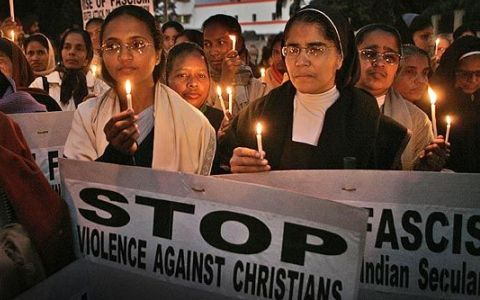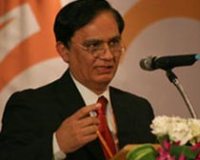REPORT: Is persecution of Muslim and Christian minorities in India on the wane?
by - 23rd January 2013
 The revoking of a statute against conversion, and a fall in the number of reports of attacks, could indicate improvements in human rights for India's minorities, according to an annual review of persecution.
The revoking of a statute against conversion, and a fall in the number of reports of attacks, could indicate improvements in human rights for India's minorities, according to an annual review of persecution.
Statistics released today (Wednesday) by the Evangelical Fellowship of India in their yearly Persecution Watch report reveal that incidents of violence towards Christians in 2012, totalling 131 were down on the 2011 recorded figure of 140.
 However, EFI Director Richard Howells,who represents over 35,000 churches in India, said: ‘The Evangelical Fellowship of India is deeply concerned at the uninterrupted and increasing hostility against the Christian minority community in the country’.
However, EFI Director Richard Howells,who represents over 35,000 churches in India, said: ‘The Evangelical Fellowship of India is deeply concerned at the uninterrupted and increasing hostility against the Christian minority community in the country’.
He added, ‘Though there has been a marginal decrease in the number of incidents, down from 140 in the year 2011, the trends in the violence look similar to last year.
‘The state of Karnataka also saw a slight decrease in the number of incidents going down from 49 to 37. However, as many incidents go unreported and therefore undocumented, this dip may not necessarily mean that the number of incidents has reduced.’
Incidents range from accusations of ‘forcible conversion’ to desecration of churches and violent attacks against individuals.
In most instances, Hindutva activists (nationalist Hindu militants) led mobs to disrupt Christian worship services and manhandled, physically and verbally abused the congregation, including women and children.
Yet, in spite of leading the attacks, complaints were mostly registered by the mobs themselves. They justify their actions against Christians with accusations of ‘forcible conversion’ – considered laughable by NGOs in view of the literally ‘outcaste’ status of these minorities.
David Griffiths, desk officer at Christian Solidarity Worldwide, told Lapido today: ‘Although it is encouraging that the incidents of violence against Christians as recorded by EFI have decreased in the past year, the big question is whether the perpetrators are brought to justice – impunity is the norm, and yet the rule of law is the only effective way of dealing with such violence.’
The police often detain Christians at the behest of the mobs according to EFI.
It is not just Christians who are singled out in India. EFI is still waiting for a reply to a petition filed in 2004, before the Supreme Court of India, seeking the inclusion of Muslim and Christian Dalits (literally ‘broken people’ formerly known as ‘untouchables’) in the Scheduled Castes. Exclusion officially prevents access to jobs and other benefits.
The third paragraph of the 1950 Presidential Order qualifies that, ‘notwithstanding anything contained in para 2, no person who professes a religion different from Hinduism shall be deemed to be a member of the Scheduled Castes.’
Subsequent amendments to the 1950 Presidential Order in 1956 and 1990 provided for the inclusion of Sikhs and Buddhists respectively within the Scheduled Caste category to access benefits such as job reservation.
Though this order was later amended to include the Dalits of Sikh and Neo-Buddhist religions, the Christian and Muslim Dalits are not included . They are literally 'outcast'.
The EFI described as ‘far from adequate’ the Indian government’s response to recommendations from seven countries including the USA, that India take appropriate action to ensure the protection of religious minorities in the country including the specific recommendations for the repeal of anti-conversion laws and the enactment of a law to prevent communal violence.
Yet in August, one state did revoke its draconian sanctions against converts, after successful action by EFI.
The Himachal Pradesh High Court held in August that section four of the Freedom of Religion Act, 2006 and Rules three and five of the corresponding Rules were unconstitutional.
An intending convert had been required under the Act to give prior notice, and was subject to a mandatory state inquiry.
The court recognised that this violated the fundamental right of privacy safeguarded under the right to life in the Constitution
With India still on the watch list of the US Commission on International Religious Freedom, the EFI is pressing for further changes in India as well as granting constitutional benefits to Dalit Christians and Muslims.
FACTBOX - by David Griffiths, CSW
Isn’t India renowned for its religious tolerance?
India has a long history of religious pluralism, and compulsions towards mutual respect and violent intolerance exist in parallel.
What is behind the violence?
A highly influential extremist Hindu nationalist network views India as a Hindu nation in which Muslims and Christians have no place, and to which they pose a threat – Muslims through population growth and violence, Christians through ‘converting’ Hindus – largely a misreading of the infectious process of change. The ostracism and violence faced by Muslims and Christians is the outworking of the Hindu nationalist view that relations between religious communities are part of a zero-sum game, in which conflict between them is inevitable.
What do NGOs want to see?
The ruling in Himachal Pradesh was a very good step forward but the larger goal must be to see the Supreme Court revisiting the ruling which it gave in the 1977 Stainilaus case, which established that anti-conversion laws were not unconstitutional. Those building this case can draw moral authority from the recent report by the UN Special Rapporteur on freedom of religion or belief which deals with the issue of conversion in light of the international human rights framework, and from the recommendations made by the previous Special Rapporteur when she visited India in 2008.
- Log in to post comments
